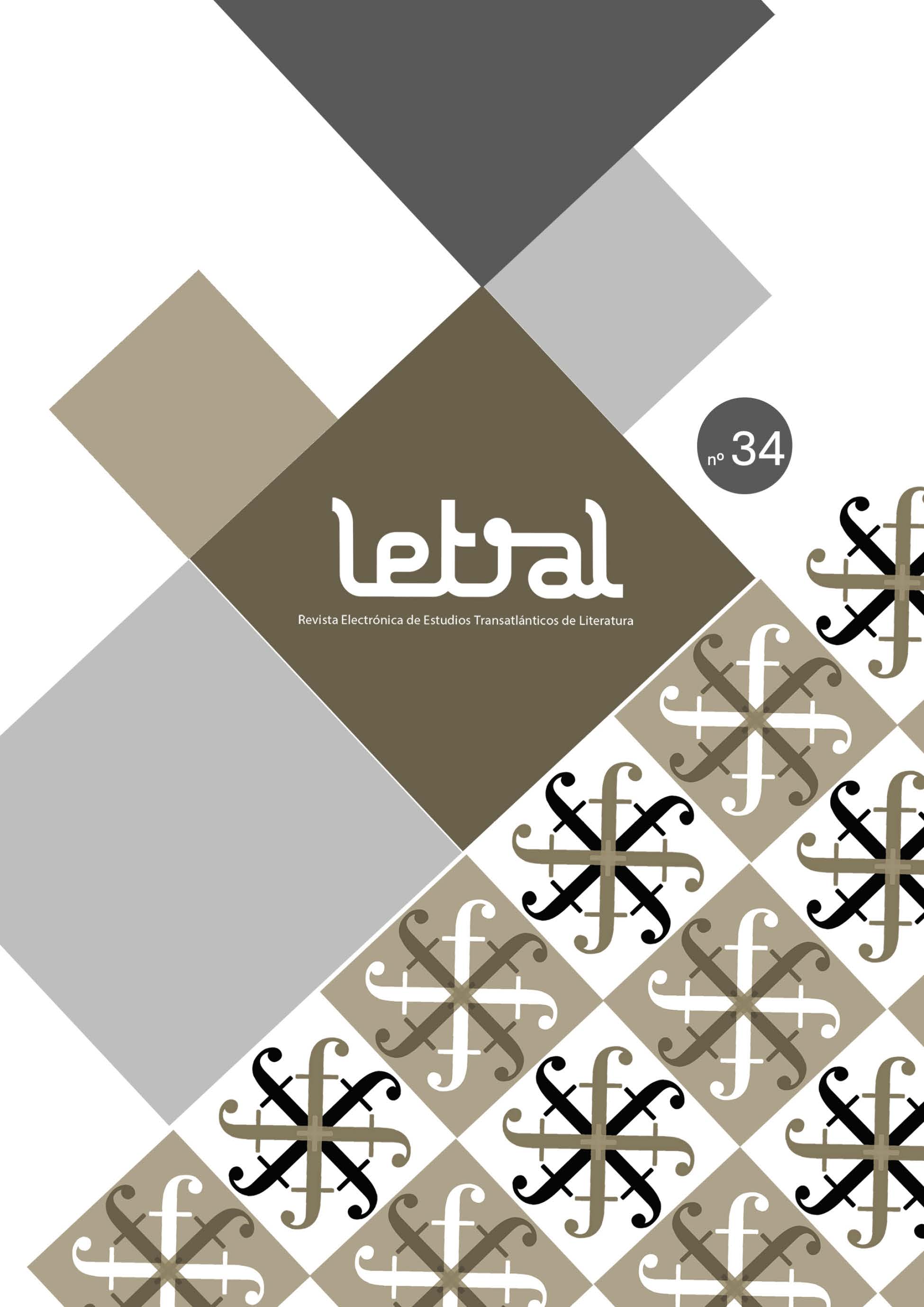El lector ante el mecanismo de lo real: "Máquina Cóndor (4.0) de Demian Schopf y las nuevas esferas performativas de la literatura en la literatura generativa
DOI:
https://doi.org/10.30827/rl.v0i34.28796Palabras clave:
Demian Schopf, Máquina Cóndor, Acontecimiento, literatura generativaResumen
La obra de poesía algorítmica Máquina Cóndor (versión 4.0) del artista chileno Demian Schopf presenta un complejo sistema combinatorio donde datos sobre el mercado de valores y las guerras económicas presentes se enlazan para generar alteraciones sobre el poema gongorino “De la ambición humana”. El presente trabajo se propone analizar la obra desde la metodología procesual de Philippe Bootz, con el fin de destacar cómo el autor manipula y adapta las particularidades del emergente género de la literatura generativa para expandir los campos de acción de la literatura como acontecimiento. Con esto observaremos cómo la máquina evidencia la presencia del lector y su potencial efecto sobre la contingencia del sistema que articula la realidad actual, en el cual los algoritmos vienen jugando un papel esencial como creadores de perfiles al servicio de los poderes disciplinarios en la era de la revolución digital.
Descargas
Citas
Aarseth, Espen J. Cybertext. Perspectives on Ergodic Literature. Baltimore, The Johns Hopkins University Press, 1997. DOI: https://doi.org/10.56021/9780801855788
Aarseth, Espen J. “No linealidad y teoría literaria”. Teoría del hipertexto, George Landow (ed.), Barcelona, Paidós, 1997, pp. 71-108.
Balpe, Jean-Pierre. Principles and Proccesses of Generative Literature. Questions to Literature. Dichtung-digital. 2005, <http://www.dichtung-digital.de/2005/1/Balpe/>
Barthes, Roland. Oeuvres Complètes. París, Seuil, 1993.
Block, Friedrich W. & Rui Torres. “Transformations in(to) the Digital”. Poesía Experimental Portuguesa Cadernos e Catálogos, vol. 2, 2007, pp. 8-24.
Bootz, Philippe. The art of programmed forms. Transitoire Observavle. 2004, <http://transitoireobs.free.fr/to/article.php3?id_article=7>
Bootz, Philippe. “Digital Poetry: From Cybertext to Programmed Forms. New Media Poetry and Poetics” en Special Issue, Lenardo Electronic Almanac, nº 5, vol. 14, 2006, <https://www.leoalmanac.org/wp-content/uploads/2012/09/04Digital-Poetry-From-Cybertext-to-Programmed-Forms-by-Phillipe-Bootz-Vol-14-No-5-6-September-2006-Leonardo-Electronic-Almanac.pdf>
Bootz, Philippe. “La poesía digital programada: una poesía del dispositivo (comunicación)”. Poéticas tecnológicas, transdisciplina y sociedad: Actas del Seminario Internacional Ludión-Paragraphe, Claudia Kozak (ed.), Buenos Aires, Exploratorio Ludión, 2011, pp. 31-40.
Carvalho Pereira, Vinícius y Maciel, Cristiano. (2013, 8-11 de octubre). “The user’s and the designer’s role and the aesthetic experience of generative literatura (comunicación)”. Brazilian Symposium on Human Factors in Computing System, Brazilian Computer Society, 2013, pp. 188-197, <https://dl.acm.org/doi/pdf/10.5555/2577101.2577140 >
Cramer, Florian. Words Made Flesh. Code, Culture, Imagination. Rotterdam: Piet Zwart Institute, 2005.
Fisher, Mark. Realismo capitalista. ¿No hay alternativa?, Buenos Aires, Caja Negra, 2016.
Gainza, Carolina. “Campos literarios emergentes: literatura digital en América Latina”. Estudios Avanzados, nº22, 2014, pp. 29-43.
Gainza, Carolina. Lo digital es un problema totalmente de lenguaje. Entrevista a Damien Schopf. Santiago, Cultura Digital Chile, 2018.
Genette, Gerard. Palimpsestos: La literatura en segundo grado. Madrid, Taurus, 1989.
Groys, Boris. “Politics of Installation”. [Conferencia] Big Ideas, Whitechapel Gallery: Londres. 2008, <https://www.e-flux.com/journal/02/68504/politics-of-installation/ >
Groys, Boris. “De la imagen al archivo de imagen - y vuelta: el arte en la era de la digitalización”. Arte, archivo y tecnología. Alejandra Castillo y Cristian Gómez-Moya (eds.), Santiago, Ediciones Universidad Finis Terrae. 2012, pp. 13-27
Hayles, Katherine N. Elctronic Literature: New Horizons for the Literary. Notre Dame, University of Notre Dame Press, 2008.
Kozak, Claudia. “Tecno-poesía experimental y políticas del acontecimiento”. Poéticas tecnológicas, transdisciplina y sociedad: Actas del Seminario Internacional Ludión-Paragraphe. Claudia Kozak (ed.), Buenos Aires, Exploratorio Ludión, 2011, pp. 53-62.
Kozak, Claudia. “Literatura digital y materialidad. Cómo se lee.” Art Matters, Ana Rodríguez Granell y Pau Alsina (eds.), Artnodes, nº 15, 2015, pp. 90-98
Landow, George P. Teoría del hipertexto. Barcelona, Paidós, 1997.
Levy, Pierre. ¿Qué es lo virtual? Barcelona, Paidós, 1999.
Nelson, Theodor H. Literary Machines 93.1. Sausolito, Mindful Press, 1993.
Oyarzún, Pablo; Schopf, Demian y López, Paz. “La Mariposa y el Cóndor. Sobre una obra de Demian Schopf”. [Encuentro], subido por Centro de Extensión Centex, 2021, <https://www.youtube.com/watch?v=nDA0Hlp8s8M >
Rancière, Jacques. Políticas de la literatura. Buenos Aires, Libros del Zorzal, 2017.
Sánchez-Mesa, Domingo. “Los vigilantes de la metamorfosis. El reto de los estudios literarios ante las nuevas formas y medios de comunicación digital” Literatura y Cibercultura, Domingo Sánchez-Mesa (ed.), Madrid, Arco Libros, 2004, pp. 11-34
Schopf, Demian. “Máquina Cóndor”. Demian Schopf, 2016, <https://demianschopf.com/images/documentos/maquina-condor-es.pdf>
Schopf, Demian. “Máquina Cóndor (versión 4.0, 2016). Explicación total del algoritmo.” Demian Schopf, 2016, <https://demianschopf.com/images/documentos/EXPLICACION%20TOTAL%20DEL%20ALGORITMO-03_09_ESP.pdf >
Schopf, Demian. “Portfolio”. Demian Schopf, 2018 <https://demianschopf.com/images/documentos/portafolio_demian_espa%C3%B1ol_lowres.pdf >
Descargas
Publicado
Versiones
- 19-11-2024 (2)
- 23-07-2024 (1)
Cómo citar
Número
Sección
Licencia
Derechos de autor 2024 Itziar Romera Catalán

Esta obra está bajo una licencia internacional Creative Commons Atribución-NoComercial 4.0.
Revista Letral es una publicación de acceso abierto e inmediato totalmente gratuita, tanto para quien lee como para quien publica. Los autores y las autoras no pagan ningún tipo de tasa por el proceso editorial de sus artículos. Permitimos la lectura, descarga, copia, distribución, impresión, búsqueda, enlace o reutilización con fines no comerciales de todos los trabajos publicados, siempre que se citen la autoría, la revista y el órgano editor. Recomendamos encarecidamente la difusión de los artículos en redes sociales (Facebook, Twitter, LinkedIn, etc.) y científicas (ResearchGate, Academia.edu, etc.), repositorios institucionales universitarios y otros repositorios públicos, blogs y webs personales o institucionales, Google Scholar, ORCID, ResearchID, ScopusID, etc. En cualquier caso, la propiedad intelectual de los artículos y los posibles derechos económicos derivados de ellos son exclusivamente de sus autores.














